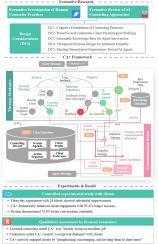为人工智能咨询师提供一个顾问启发的代理框架,以提高客户参与度
IF 12.5
1区 社会学
Q1 SOCIAL ISSUES
引用次数: 0
摘要
目前的人工智能咨询系统难以维持有效的长期客户参与。通过对专业咨询师和人工智能咨询实践的形成性研究,以及系统的文献回顾,我们确定了五个关键的设计考虑因素,将人类咨询专业知识与人工智能能力联系起来。基于这些见解,我们提出了CA+,一个AI咨询师的顾问启发代理框架,通过三个组成部分来提高客户参与度:(1)治疗策略模块:实现分层目标-会话-行动计划,基于客户反馈进行双向适应;(2)沟通形式模块:协调平行引导和共情路径,平衡治疗进展和情感共鸣;(3)信息管理:利用客户档案和治疗知识数据库进行动态的、情境感知的干预。对24个客户进行的为期三天的纵向研究表明,与基线系统相比,CA+在客户参与度、感知同理心和总体满意度方面有显著改善。此外,两名持牌顾问证实了其高度的专业性。我们的研究展示了通过认知理论增强法学硕士参与心理咨询对话的潜力,为法学硕士系统建立了一个基础框架,该框架要求在以人为中心的应用中进行推理、记忆、移情和持续的多回合交互。本文章由计算机程序翻译,如有差异,请以英文原文为准。

A counselor-inspired agent framework for AI counselors to enhance client engagement
Current AI counseling systems struggle with maintaining effective long-term client engagement. Through formative research with professional counselors and AI counseling practices, alongside a systematic literature review, we identified five key design considerations that bridge human counseling expertise with AI capabilities. Based on these insights, we propose CA+, a Counselor-Inspired Agent framework for AI counselors to enhance client engagement through three components: (1) Therapy Strategies Module: Implements hierarchical Goals-Session-Action planning with bidirectional adaptation based on client feedback; (2) Communication Form Module: Orchestrates parallel guidance and empathy pathways for balanced therapeutic progress and emotional resonance; (3) Information Management: Utilizes client profile and therapeutic knowledge databases for dynamic, context-aware interventions. A three-day longitudinal study with 24 clients demonstrates CA+’s significant improvements in client engagement, perceived empathy, and overall satisfaction compared to a baseline system. Besides, two licensed counselors confirm its high professionalism. Our research demonstrates the potential for enhancing LLM engagement in psychological counseling dialogues through cognitive theory, establishing a foundational framework for LLM systems that demand reasoning, memory, empathy, and sustained multi-turn interactions in human-centered applications.
求助全文
通过发布文献求助,成功后即可免费获取论文全文。
去求助
来源期刊

Technology in Society
Multiple-
CiteScore
17.90
自引率
14.10%
发文量
316
审稿时长
60 days
期刊介绍:
Technology in Society is a global journal dedicated to fostering discourse at the crossroads of technological change and the social, economic, business, and philosophical transformation of our world. The journal aims to provide scholarly contributions that empower decision-makers to thoughtfully and intentionally navigate the decisions shaping this dynamic landscape. A common thread across these fields is the role of technology in society, influencing economic, political, and cultural dynamics. Scholarly work in Technology in Society delves into the social forces shaping technological decisions and the societal choices regarding technology use. This encompasses scholarly and theoretical approaches (history and philosophy of science and technology, technology forecasting, economic growth, and policy, ethics), applied approaches (business innovation, technology management, legal and engineering), and developmental perspectives (technology transfer, technology assessment, and economic development). Detailed information about the journal's aims and scope on specific topics can be found in Technology in Society Briefings, accessible via our Special Issues and Article Collections.
 求助内容:
求助内容: 应助结果提醒方式:
应助结果提醒方式:


